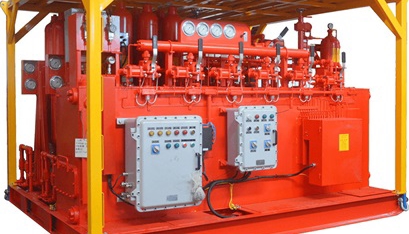The Importance of Bop Control System in Offshore Operations
Offshore operations in the oil and gas industry require a robust and efficient blowout preventer (BOP) control system to ensure safety and operational efficiency. As the last line of defense against a blowout, the BOP control system plays a critical role in preventing uncontrolled releases of oil and gas from wells. This article will delve into the significance of a well-designed BOP control system and how it contributes to securing offshore operations.

Ensuring Safety in Offshore Operations
The primary function of a BOP control system is to provide a reliable means of controlling the BOP stack, which comprises ram preventers, annular preventers, and other critical equipment. By enabling operators to remotely control the BOP stack, the control system allows for quick and effective response to well control situations, thereby enhancing safety. In the event of an emergency, such as a kick or blowout, the BOP control system can close the preventers to seal off the well and prevent the uncontrolled release of hydrocarbons.
Enhancing Operational Efficiency
In addition to safety considerations, an efficient BOP control system is necessary to optimize offshore operations. The system should be designed to enable seamless integration with other control systems, such as the drilling control system and the rig management system. This integration allows for the efficient monitoring and control of all critical functions of the drilling operation, resulting in improved operational efficiency, reduced downtime, and enhanced overall performance.
Key Components of a BOP Control System
A well-designed BOP control system consists of several key components. The primary control unit serves as the central hub, receiving signals from various sensors and control inputs and transmitting signals to the BOP stack. Hydraulic accumulators provide the necessary hydraulic power to operate the BOP stack, ensuring a fast and reliable response. Control panels and HMI (Human-Machine Interface) systems provide operators with a user-friendly interface to monitor and control the BOP stack, displaying critical information and facilitating swift decision-making. Additionally, safety features, such as emergency shutdown systems and redundancy, are essential to ensure fail-safe operations.
The Future of BOP Control Systems
As technology continues to advance, so does the evolution of BOP control systems. The industry is witnessing the development of more sophisticated and intelligent systems capable of real-time data analysis and predictive maintenance. Furthermore, the integration of digitalization and automation technologies is expected to revolutionize offshore operations, enhancing safety and efficiency. These developments will enable operators to remotely monitor and control BOP systems, reducing the need for personnel on offshore rigs and further minimizing risks.
In conclusion, the BOP control system is a crucial component of offshore operations, ensuring safety and efficiency. By providing a reliable means of controlling the BOP stack, the system allows for quick responses to emergencies, preventing uncontrolled releases of oil and gas. Moreover, an efficient BOP control system enhances operational efficiency by seamlessly integrating with other control systems. The future holds promising advancements in BOP control systems, paving the way for even safer and more efficient offshore operations.
By continuing to use the site you agree to our privacy policy Terms and Conditions.